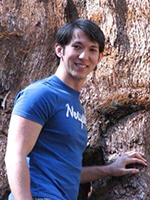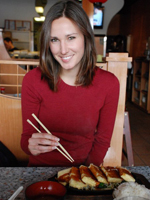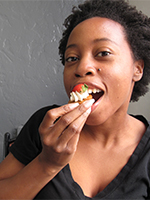A guest blog by The Veggie People originally published at ThePeopleProject.com on Feb. 5,2013

Although there are plenty of people who will disagree with me, it is important to remember, especially if you are transitioning over to a vegan lifestyle, that there is no one “correct” way to be vegan. Contrary to what the makers of the Hollywood film “Scott Pilgrim vs. The World” would have us think, there is in fact no vegan police, and there is no one all-knowing authority on the subject of “being vegan.” You will not be arrested for eating bread that may contain egg products, and you will not be punished for begrudgingly allowing your in-laws to bring a non-vegan lasagna to your potluck dinner. Although for many of us, veganism represents a lifestyle or a philosophy, it is not a religion, nor does it come with a set of rules or precepts that any one person is required to adhere to.
For some, veganism represents a dietary choice and nothing more. For others, it represents a path to a healthier, more vibrant lifestyle. And for others, it represents a social and political movement against the global environmental degradation that is the direct result of factory farming. For others still, it represents a moral and ethical choice in favor of a kinder, more compassionate vision of the world, which allows us to live in conformity with our own internal values, a vote in favor of animal welfare and in favor of the right of an animal to live without human-imposed fear, torture, mutilation, and suffering. For many of us – and I will venture to say for most of us – veganism represents some combination of the above, any one of which may be of greater importance than the others at any point during our lives.
I have met people who are vegan exclusively for health-related reasons. Often, due to an illness, or to a physical ailment or condition, individuals will turn to a vegan diet in an effort to treat themselves, often with great success. Many such vegans are uncomfortable discussing the idea of animal rights or animal welfare, because for them, their primary motivation for adopting a vegan diet has nothing at all to do with ethics or morality, but represents instead a conscious vote in favor of their own health. I have also met vegans who have chosen a vegan lifestyle almost exclusively for moral or ethical reasons. These individuals repeatedly and courageously demonstrate their commitment to fight for the rights and welfare of factory-farmed animals, relegating “health” to a secondary reason for their choice to adopt a vegan lifestyle.
Just as there are so many different individuals on the face of this planet, there are – naturally – just as many different ways to be vegan. There are some vegans who abstain from eating and consuming all animal products, but who will buy clothing made of wool. Others will abstain from eating and wearing all products that contain animal ingredients, except those that contain bee pollen, beeswax, and honey. Others still will abstain from eating, wearing, and consuming all animal products, with the exception of some products like maple syrup, white sugar, and various wines and beer – which may or may not have been processed with animal products. Others will strictly abstain from eating and consuming all animal products whatsoever, including those that may have come “into contact” with animal products.
Some vegans will eat soy or wheat; some will not. Some will eat processed food or junk food; some will not. Some will eat cooked food; some will not, preferring to eat only raw fruits, vegetables, nuts, seeds, and grains. Some vegans will date non-vegans; some will not. Some vegans will raise their children as omnivores, while other vegans will raise their children on a vegan diet. Some vegans have pets; others have companion animals. Some call themselves vegan; some call themselves vegetarian; still others refuse to call themselves vegan or vegetarian, preferring to say that they have adopted a “plant-based diet.” There are as many faces of “being vegan” as there are vegans in the world, but there is one thing that we share: We all abstain from consuming animal products as much as is possible under the circumstances – the question of how much, when, why or how remaining a matter of individual choice or preference.
Activism within the vegan community is also a question of personal choice. Many vegans are health activists, who by example or as part of a larger social movement, invest their time and energy toward educating others about the health advantages of adopting a vegan diet. Others are environmental activists, who by example or as part of a larger social movement, invest their time and energy toward educating others about the environmental advantages of adopting a vegan diet and lifestyle. Still others are political activists, animal rights activists, human rights activists, or peace activists, who by example or as part of a larger social movement, invest their time and energy toward promoting the vegan diet and lifestyle as a progressive move in favor of a brighter, more promising future for all of the inhabitants of the earth. But just as there are vegans who are activists within this community, there are vegans as well who do not consider themselves activists at all, who choose to adopt a vegan diet or lifestyle for their own quiet reasons, who prefer not to engage in any political discussion about environmental issues or animal welfare, or even about health and nutrition. For them, veganism is a personal dietary choice, and nothing more.
Regardless of the foregoing, given the importance that we place on the mighty dollar (or euro, pound sterling, peso, etc.) in today’s society, there is no question that when you choose to adopt a vegan diet, many people – other than your friends and family – will notice. The meat, dairy, and egg industries will notice. The fish and shellfish industries will notice. The leather, fur, and wool industries will notice. Company executives who realize that they are not getting your business because there are animal ingredients in their products, may decide to substitute these ingredients with plant-based ingredients – not out of any effort to “do good” in the world, but because they want YOU to become their customer. Company executives who realize that they are not getting your business because they are testing their products on animals in laboratories, may suddenly “see the light” and decide that these antiquated and unreliable tests are no longer necessary. In fact, some of these company executives might even decide to roll out a line of cruelty-free vegan products in an effort to win back your loyalty. Whether you mean to or not, whether your decision is a personal one or one that is motivated out of a conscious desire to change the world, there is no question that people will notice that you are no longer consuming animal products.
Trust me. EVERYONE will notice.
I am one who believes in personal, small-scale activism – which I believe to be an extremely potent form of activism. Every time you meet a person and say “I’m vegan,” you are making a powerful, but quiet statement in favor of a particular vision of the world. It may not even be your intention to do so, but at this particular point in time, when even avid meat-eaters are expressing concern about the additives and hormones that are being used to produce the meat on their dinner plate, your statement makes people think twice about a whole range of issues, from animal welfare and factory farm runoffs to mercury-tainted fish and mad cow disease. And so, whether or not it was your intention to do so, you have now set the stage for a discussion – which may or may not take place, depending on how you feel at the moment, how open you are about “being vegan,” and whether you think your dinner companions are open-minded enough to listen to what you have to say.
My objective in writing this article is simply to say – especially to those of you who are currently transitioning to a vegan diet – that there is no one correct way to “be vegan.” So, relax, have fun, get out and try new things. Try vegan junk food or processed food. Try macrobiotic cuisine. Try raw vegan food. Try vegan superfoods. Try an intimate dinner for two at a swanky, gourmet vegan restaurant. Visit an animal sanctuary, or your local shelter. Volunteer at an organization that promotes vegan school lunches. Don’t worry about whether you should give away your leather coats right now. And don’t worry too much about whether there was any dairy in that bread you ate for lunch at the restaurant. After experimenting with the vegan diet and lifestyle, you will eventually make the choices that are right for you. And don’t think twice about what other people have to say about it. Give yourself the time to ease into the lifestyle, and to educate yourself about the things that are of greatest importance to you.
Here’s the great thing about becoming vegan. Whether your choice to adopt a vegan or plant-based lifestyle is motivated out of a concern for your health, the environment, or the animals – or whether you just think vegan food is too delicious to pass up – whether you’re an eco vegan, ethical vegan, glam vegan, celebrity vegan, gourmet vegan, junk food vegan, raw food vegan, power vegan, fitness vegan, or an all-round super-vegan, your choice is one that will get people to sit up, take notice, and start talking. And whether that is your intention or not, there is no question that this is a good thing for the vegan community and for the world at large. The more we talk to one another, the greater the likelihood that others will listen, and the greater the likelihood that we, as a community, will come up with solutions to create a kinder, better, healthier, happier, less violent, more prosperous world for animals and humans alike. And seriously, how bad would that be?
The Veggie People want to bring together a world community of vegans, with the objective of stimulating debate and discussion about a wide range of issues that are central to the creation of a compassionate society. In building such a community, we look not only to vegans, but to vegetarians with whom we share a desire to end animal cruelty around the world, and to omnivores who are interested in adopting a cruelty-free lifestyle or who wish to learn about veganism. Please visit their website.





